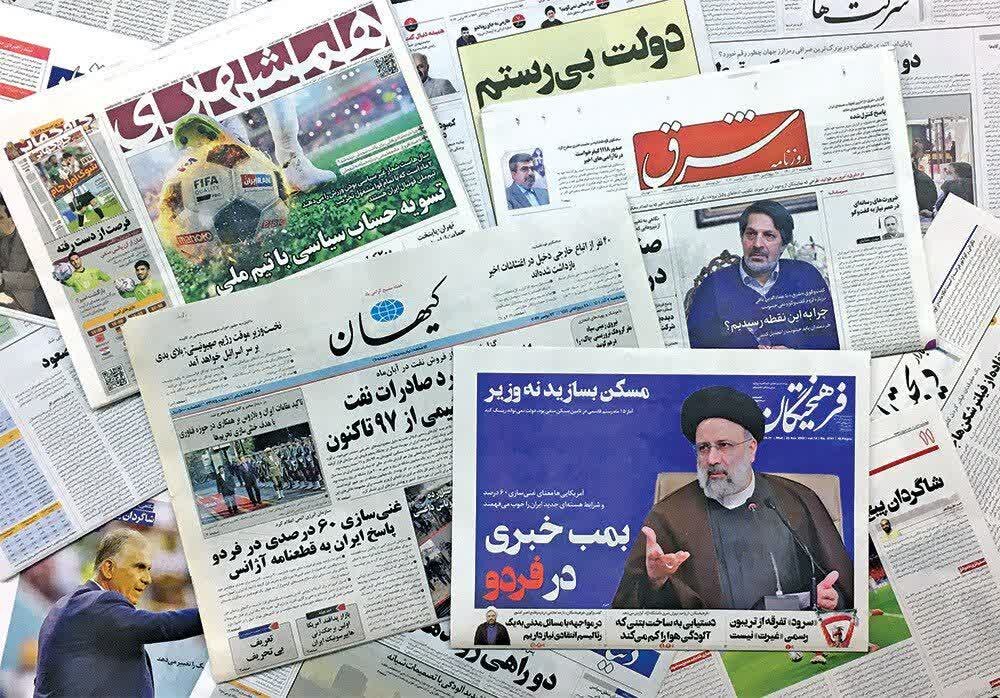Eagle 44 is a unique military base in the world

Yesterday, Iran unveiled its newest and most up-to-date defense fortifications, which was an underground air base, the Iran newspaper writes.
The publication writes there are a few points about the military base: First, its unveiling carries an important message for some regional and extra-regional actors who have been saber-rattling for some time by changing their tune.
Second, pursuing a defense policy based on civil defense, which for years not only minimizes the costs to protect sensitive and military centers but also leads to compliance with the principle of surprise in operations.
The third point is a distinctive feature of the military installation compared to similar bases in the world, which shows the technical capability of the engineers who built it.
Etela’at: Do not leave the earthquake to God
In a commentary, Etelaat refers to the huge earthquake in Turkey and Syria and warns about the occurrence of a similar incident in Iran.
It also refers to the recent Khoi earthquake and says: The lesson that these events should teach us is not to allow irreparable damage in natural disasters.
The daily also mentions the possibility of an earthquake in Tehran and writes: We all know the unbelievable danger of a strong earthquake in the capital, and we just say God forbid and ask God that this never happens. But it is not wise to forget the possibility or leave everything to God.
The newspaper points how the Japanese have dealt with the earthquake problem over the past few decades and writes: For example, in the earthquake-prone country of Japan, even the occurrence of strong earthquakes should be accompanied by minimal losses and damages.
It is hoped that the recent events will make us think about planning for a better and safer future. God willing.
Arman-e-Melli: Grossi's important journey
In an op-ed in Arman-e-Melli, political analyst Hassan Beheshtipour refers to the difference between Iran and the IAEA regarding the change to the interconnection between two clusters of centrifuges in Fordow and the Western reaction to it and writes: It seems that the misunderstanding will be cleared up with Mr. Grossi's visit to Iran to the extent that we can find answers to the IAEA's three questions.
An agreement may be made with the IAEA. Although it seems unlikely that Iran will immediately answer the queries in the same meeting with Grossi, the two sides can reach a solution to answer the questions gradually or based on a specific schedule.
If the IAEA's questions are answered, it seems that a new round of negotiations will be formed.
The U.S. was waiting for the results of the protests in Iran, and when it noticed that the unrest did not get to a result, Washington is now more willing to talk.
If we reach a proper solution during Mr. Grossi's visit to Tehran, we can both prevent the approval of a new resolution in the Board of Governors and have a new start in the dialogue with the Europeans and Americans.
Javan: Eagle 44, Iran's bargaining chip in the region
There were three developments in the military field in the last two months, namely the Zulfiqar 1401 military exercises and the unveiling of some achievements, the joint exercise between the U.S. and the Zionist regime which was an answer to Iran's, and the first underground air base called "Eagle 44".
Such moves by the army have a deterrent aspect above all because the strategy of the U.S. and the Zionist regime is usually complete destruction of the rival's military power in the first moments of the war (first strike, also known as preemptive strike) and the construction of bases like Eagle 44 will make their strategy ineffective. And for Iran, which has created underground cities for missiles, drones, and now fighters, it is a great advantage in any possible war.
Ham-Mihan: JCPOA is a hurdle to Tehran-Riyadh ties
Ham-Mihan examines the negotiations between Iran and Saudi Arabia and writes: In recent years, efforts have been made to re-establish diplomatic relations between Saudi Arabia and Iran, and finally, the first round of talks began in September 2021 in Baghdad, and five rounds were held until April 2022.
The reopening of Iran's office in the secretariat of the Organization of Islamic Cooperation in Jeddah, and the return of the ambassadors of Kuwait and the UAE to Iran were among the achievements of these talks.
The date for the sixth round has not yet been determined.
Iraqi Prime Minister Mohammad Shia al-Sudani recently asked his foreign minister to resume efforts to organize the sixth round of negotiations, but evidence indicates that Saudi Arabia considers the deadlock in negotiations to revive the JCPOA as an obstacle to resuming relations.
Siasat-e-Rooz: Ambiguity surrounding the JCPOA
Siasat-e-Rooz writes: The status of the JCPOA is unknown, there is no clear horizon for it, the revival of the agreement, which was limping from the beginning, needs the breath of the Messiah! Iran's nuclear agreement with 5+1 or, in other words, Iran and the U.S. deal had a lot of weaknesses from the very beginning.
The agreement was arranged in such a way that Iran was the only country obliged to comply.
Iran did not benefit from adhering to its commitments. However, the opposite party, especially the United States, not only did not fulfill its commitments, it also put under pressure and sanctions every country that cooperated economically with Iran.
Upon entering the White House, Trump finally announced his withdrawal from the nuclear agreement with Iran.
Although Europe has repeatedly said that the JCPOA is not dead, it has not done anything to revive it in practice. But Iran must be freed from dependence on the agreement that conditioned its economy.
Leave a Comment